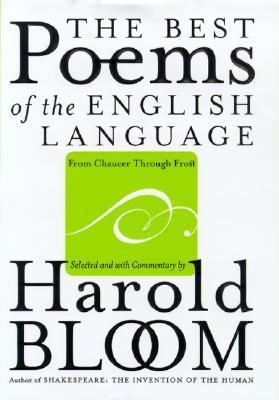
Further to Christopher Batty’s earlier post, I do not want to seem to be coming to Bloom’s defense any time he is mentioned here, and I have been reluctant to comment, but…
In Bloom’s introduction to The Best Poems of the English Language, he states, “this vast book is intended for every kind of personal use” (his emphasis). He later on the same page says: “Essentially, this is the anthology I’ve always wanted to possess. It reflects sixty years of deep and passionate reading, going back to my love of William Blake, Hart Crane, and of William Shakespeare and John Milton, that vitalized my life from my twelfth year onward.” This book is very much about Bloom and he admits as much on the first page of his introduction.
This is not to say that his name alone doesn’t endow the book with a certain power, Bloom-as-canonizer or Bloom-as-Pontiff. But, a close reading of the Introduction and “The Art of Reading Poetry” (included in Best Poems and published separately) shows that Bloom is speaking as Bloom and for Bloom:
One of the few gains from aging, at least for a critic of poetry, is that taste matures even as knowledge increases. As a younger critic, I tended to give my heart to the poetry of the Romantic tradition, doubtless spurred to polemics on its behalf by the distortions it suffered at the hands of T. S. Eliot and his New Critical academic followers: R. P. Blackmur, Allen Tate, Cleanth Brooks, W. K. Wimsatt among them. In my early seventies, I remain profoundly attached to the sequence that goes from Spenser through Milton on to the High Romantics (Blake, Wordsworth, Shelley, Keats) and then on to the continuators in Tennyson, Browning, Whitman, Dickinson, Yeats, Stevens, Lawrence, Hart Crane. With Chaucer and Shakespeare, these remain the poets I love best, but maturation has brought an almost equal regard for the tradition of Wit: Donne, Ben Jonson, Marvell, Dryden, Pope, Byron, and such modern descendants as Auden and Eliot (a secret Romantic, however).
Bloom is speaking about Bloom and for Bloom — his ideas and preferences have changed over time. The exegetical work that follows is Bloomian to be certain, but what else could we expect?
Literary critics — all of us, I imagine — make value judgments about literature. We make these judgments when we decide what to teach and what not to teach. Having just returned from a conference on the popular romance novel and pedagogy, I am keenly aware of the fact that when we design a syllabus, we are, in a sense, canonizing authors/texts (at least within the context of our seminar rooms and lecture halls). Even in teaching miserable texts and calling them miserable texts, we are acknowledging that there is some value in studying the text (likely to show students what a bad text does that good texts don’t do). The solution, I suppose, is that we could discard all value judgments, but I’m all too certain that the subjectivity of the reader will come out, we will decide if we like a text or not, we will call it good or bad.
All readings are deeply personal, and that is precisely the point. I don’t think Bloom denies “blind spots,” actually it seems he recognized that he had them and has matured with age. We all have “blind spots,” and that is, as Michael notes, Frye’s point — and Frye certainly had blind spots as well. All literary critics do. Bloom is at his most polemical in The Western Canon but, I think, if we read it closely, Bloom’s argument is less with a canon and more with an argument against cant, against the School of Resentment, and so on. He is frustrated that the text has been lost to ideological theorizations of texts. Now, that is yet another value judgment and some of us may agree that we should discard theory altogether, and others will want more of Derrida, Butler, Spivak, Foucault, and so on.
The point of all of this, if there must be one, I suppose, is that the literary experience is deeply subjective. This deep subjectivity is perhaps what makes the institutionalization of literature so problematic. How do we position literature in the academy and still maintain the academy’s faith in literature as an area of study? If literature is deeply personal, deeply subjective, how then can it be studied in an institutional setting? What is the role of the institution in the study of literature?